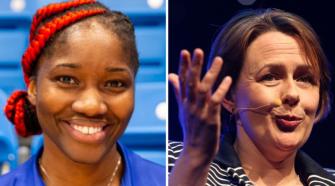- HOME
- NEWS & INSIGHTS
- THOUGHT LEADERSHIP
- conversation-tanni-and-ama-international-womens-day-2022
Image

International Women’s Day is a global celebration of the social, economic, cultural and political achievements of women.
This year's campaign theme is #BreakTheBias. Imagine a gender equal world. A world free of bias, stereotypes and discrimination. A world that's diverse, equitable, and inclusive. A world where difference is valued and celebrated. Together we can forge women's equality. Collectively we can all #BreakTheBias!
To help SportsAid mark International Women's Day 2022, Baroness Tanni Grey-Thompson and Ama Agbeze MBE recently shared a conversation in which they discussed the growing popularity of women’s sport, the importance of encouraging more girls to participate in physical education and the need to boost female representation at boardroom level and in senior leadership positions. They also highlighted how a lack of TV exposure limited the potential for role models when they were young, the continued fight for greater visibility and sponsorship, and changing attitudes towards disability.
Role models, greater visibility and changing the narrative
TG-T: “There weren’t any disabled women playing sport which you could see on the TV when I was growing up. There was stuff as a junior – older athletes – and things like that but actually it was really difficult because if I think about my only inspirations….it was all men. It’s a bit sad really. It worked for me at the time but what’s amazing now is that you have a whole list of women that can be named who are exceptional in their field. That’s quite exciting. I couldn’t name a female athlete when I was growing up but that’s probably because I’m 52-years-old! If you look at the time, and where I came from, that’s probably quite hard.”
AA: “I’m almost as old as Tanni! There was a lot of men’s sport everywhere and my dad watched a lot of it. I used to watch boxing and motor racing with my dad, and I loved athletics. Athletics was probably the first time that I looked and saw female athletes doing things. I don’t think I looked at them specifically as being female at that exact moment. I think it was more because men did everything and the realisation came later where I just thought….‘oh, I never see women doing anything’. It was almost for me that sport was a man’s thing and that’s what you grew up seeing. When I got a bit older I went to Birchfield Harriers and Denise Lewis was there and I was like ‘wow, she’s incredible!’. So there was her, and Clova Court, who was a predecessor of Denise. I just thought ‘these are incredible women and they’re doing what they love and they have amazing bodies and they’re doing sport’….so I started to think ‘if they can do it, why can’t I?’ My parents were probably like ‘you can’t because you’re getting an education and studying!’.”
TG-T: “I think I was lucky that sport didn’t feel gendered at that age. My parents were really supportive of me being active, playing sport and getting better at it. It didn’t feel like there was a barrier, but if you looked at Grandstand back then, it was all men’s sport. So when you saw women’s sport it was like ‘wow’. It started to change in my 20s which was great. We do need to see role models in loads of sport, because for girls, they don’t always necessarily make the same connection to sport that boys do. You’ve just got to see women at all different levels. I’ve done so many interviews over the years where a grumpy, misogynistic bloke has told me women don’t play football the same as men.”
AA: “I think it is just great because, as Tanni says, there are so many role models for women. But I think women’s sport definitely suffers from a lack of sponsorship and a lack of visibility. I would hope for the future that it does receive more visibility, and more sponsorship, and we need people to be bold enough to say ‘we’re going to do this’, whether it’s invest in the sport or put it on TV more.
I do think there are lots of companies who are trying to do that and advance it forward, and because of how far behind it is, we need more importance and impetus placed on it. We need to get past the whole ‘they don’t play as well as men’ mindset too….they’re not trying to play as well as men….they’re trying to play like females playing female sport! We are moving in the right direction and there are so many more female role models….but we need more across many different sports and at all different levels. I think there’s been a push more recently to get more diversity and females on boards, within top-level coaching staff and at executive level, and that is definitely the case, and until you have females contributing to the decisions which are being made then it’s always going to be looked at from a man’s point of view. Until we change the narrative in that regard….we’re still going to lag behind. Basically there are lots of things which need changing and they’re on different levels….but any opportunities we have to shout about it….people will be rolling their eyes thinking ‘oh, this again’ and we need to get to the point where we don’t have to talk about this!”
Growing popularity, paralympic equity and school sport
AA: “The Gold Coast helped grow netball’s popularity in the UK without a doubt. It’s interesting when comparing how Australia and New Zealand both see netball compared to here. In New Zealand, the Ferns are respected on a par with the All Blacks – and financially they are not in the same position, but in how society see them, they have got huge respect for them and they are just treated as high-performance sportspeople. And equally, I’ve played for clubs out there, and there are times when you train with the rugby clubs there and they just see you as an individual who’s training in high performance. So we may go and do weights sessions with a rugby team, and we’re having competitions, and it’s just like we’re athletes in training, and so when I see that kind of thing, and come back to the UK….it’s completely different. And that’s disappointing as I know where it can go. Netball has definitely changed, even in my time, when it comes to the viewership. So I think that when I was younger and used to play, it was just school girls who would come to watch us, and now the supporters are more mature, there are families, men, as well as school girls, so that shows us how the mindset is shifting towards how people look and view netball in this country.”
TG-T: “I went to train in Australia in 1993 and netball was on the Evening News. That was actually a bit of a light-bulb moment for me because you just go ‘this is how it could be’ and that was 1993. The number of events for women at the Paralympics has changed quite a lot, in terms of reaching equity, so that’s really good. I still think there is a lot of barriers for disabled women around the world and I think that still poses a real challenge but it’s got to come from the top-down in terms of giving people opportunities. The Commonwealth Games, where they have such a broad range of sports that are there, that’s quite exciting. We can’t have a second Commonwealth Games because there’s not enough depth, and they’re picking sports which are not so dependent on really expensive equipment, because there’s a lot of kids in this country who can’t afford equipment, and even more so in developing countries. The range of sports they have picked is really interesting because that really does have the ability to change views on how they see disability in that country in a different way. Without getting too deep into disability politics, the attitudes towards disabled people in this country hasn’t always been brilliant and still isn’t, so if you can use sport to help in culture and life then that’s actually really positive. You even look at the team photos over the years [female representation]….Seoul was my first Paralympic Games and there weren’t huge numbers of women on the team. That was what it was! But then you kind of did notice when it started to change. And what Ama is saying about sponsorship, you look at 2012 and it was called the women’s Games, because you had Jess [Ennis-Hill] and Ellie Simmonds, that’s the shop window, and then it’s about the stuff that has to happen underneath. The facts are that in school sporty boys are often more valued than sporty girls.”
AA: “Boys are encouraged to do sports more than girls. Girls tend to be more body conscious than boys tend to be. So actually I think girls often need to be more pushed into sport or told, and I think sport is often seen as bad or has connotations that people don’t like. We need to move to live, to be healthy and so actually just teaching girls at school that it’s OK to sweat, it’s OK to not look your best but be active, we’ve definitely missed the boat on that and I think we need to change the perception of physical activity and sport for girls, in particular, to encourage them do it. Because for boys it’s OK for them to get muddy, to get dirty, and go and kick the ball around, but it’s not the same for girls and it shouldn’t be, but I think what Tanni was saying about disability, so many countries, not in the Western world, used to shun disabled people, and cast them aside, they brought shame on their families, and actually I think through sport, now these countries start to think….‘these people are valuable to us’. They then start putting funds into disability sport and people realise that actually you can represent your country. I just think sport is a massive tool with which to do that. And I think in terms of female empowerment…again why not use sport?”
Boosting representation, parity in coverage and future hopes
AA: “There have been developments and there is still work to do. There have been times when I’ve thought ‘am I here because I’m black or a female?’ and then I kind of think, ‘well I do have the skills to be here’, so even if that is the case, I have lots of things which I can input and you almost carry the mantle in terms of showing people, you may have put me here to tick a box, but I have things to say and I’m going to bring my best self to the position and the role. Then they may second guess, if they think detrimentally about women….and think again, so there are definitely steps to move forward.”
TG-T: “I had a really funny experience around 10 years ago when a sport approached me and said about ‘putting a woman on the board’ and it was said with a tone, and I thought ‘oh, OK’….that wasn’t the best start to the meeting for me! And this guy then said ‘they’re going to come and talk about women’s issues’, and then he told me why the women’s representative didn’t have to be a woman….so then I’m thinking ‘why are you talking to me?’. It went on and on, and women’s issues was mentioned so many times, that was the phrase my grandmother would use for menstruation, so then I said….‘so I’m going to talk about periods?!’ I thought ‘this is amazing’ and I carried on a bit further than that and this poor guy turned green in front of me. This is 10 years ago….it’s not 50 years ago. Funny enough I didn’t get asked to apply! My thoughts are ‘don’t do us a favour’ because actually, one of the amazing things about 2012, is that for a Games to be a success you need spectators and the ethos here was that you need to be able to sell tickets to every single part of the country, every single person, cheap ones, expensive ones and everything in between, and actually sport is a business, and you need all the different voices to make it work and to be successful as a team. It’s a long-time coming and I just want to see it happen quicker.”
AA: “My main hope for the future is to see more female sport in the media. We have come a long way but we haven’t gone far enough. Typically, if I watch the news and the sport comes, on most days there is nothing about female sport, and actually, it would be great if it was 50/50 because there is so much female sport that happens, and I say that’s what I want because if we get to that position, it probably means that we’ve got more diversity in coaching positions, executive positions, on boards, in journalism, people who make decisions, and then sponsorship will increase, and if that happens, all the other things should follow. Tanni touched upon it earlier, it’s not just the top level, you want to see it at the grassroots and see it through all the levels on the way up. Hopefully when we see parity in coverage, it means that we have a system that works amazingly and it’s nothing to do with race, sex, religion, gender….it’s just a case of you’re the best person for the job.”
TG-T: “I remember when Andy Murray appointed Amélie Mauresmo as his coach and they talked about Andy Murray being really brave! So when that happens and nobody bats an eyelid, when you have a woman coaching a Premier League team….we’re so far away from that aren’t we?! You see stuff in the States where women are assistant coaches on men’s basketball teams, and NFL stuff….when you have that, it feels like real change is happening. And yes definitely more women’s sport on TV….and more women as agents!”
International Women’s Day is a global celebration of the social, economic, cultural and political achievements of women. This year's campaign theme is #BreakTheBias.

